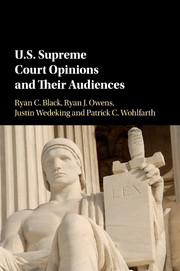Book contents
- Frontmatter
- Dedication
- Contents
- Acknowledgement
- 1 Introduction
- 2 A theory: using opinion clarity to enhance compliance and manage public support
- 3 Estimating the clarity of Supreme Court opinions
- 4 Supreme Court opinions and federal circuit courts
- 5 Supreme Court opinions and federal agency implementors
- 6 Supreme Court opinions and the states
- 7 Supreme Court opinions and the secondary population
- 8 Establishing compliance as a function of clarity
- 9 Conclusion
- References
- Index
9 - Conclusion
Published online by Cambridge University Press: 05 February 2016
- Frontmatter
- Dedication
- Contents
- Acknowledgement
- 1 Introduction
- 2 A theory: using opinion clarity to enhance compliance and manage public support
- 3 Estimating the clarity of Supreme Court opinions
- 4 Supreme Court opinions and federal circuit courts
- 5 Supreme Court opinions and federal agency implementors
- 6 Supreme Court opinions and the states
- 7 Supreme Court opinions and the secondary population
- 8 Establishing compliance as a function of clarity
- 9 Conclusion
- References
- Index
Summary
In his influential book, Judges and Their Audiences, Larry Baum argued: “the vantage point of audience can enhance our capacity to understand [judicial] choices” (Baum 2006, xii). We agree. Baum focused on how personal audiences could influence judges’ behavior. Would judges who valued the adoration of lawyers change their behavior when the lawyerly class opposed overturning a precedent? Would judges who value the respect of interest groups render more conservative or liberal decisions than they otherwise might in order to retain those groups’ support? Would judges who value professional advancement change their behavior so as to get elevated? According to Baum, such personal features influence the choices judges make.
Whereas Baum focused on how personal audiences influence judicial behavior, we focused on how audiences might influence justices for instrumental reasons. We focused on whether those audiences influence the clarity of High Court opinions. Our goal was to determine whether justices alter the clarity of their opinions to adapt to their audiences and enhance compliance with their decisions. Our theory was that justices are goal-driven actors who want to see their decisions implemented faithfully, and that they will do what they must to enhance compliance and manage public support. In our context, this involved writing clearer opinions. Why? Because clearer opinions can remove the discretion of audiences to shirk, make it easier for others to spot and alert the Court of noncompliance, better assist those actors who are inclined to comply with the Court's directives, and improve or maintain the Court's standing among the mass public.
The results across a wide range of analyses support our theory. We looked, first, at the conditions under which lower courts might influence Supreme Court opinion clarity. We argued that legal and ideological goals would affect how justices write their opinions. For starters, we argued the heterogeneity of the circuits is important to justices because one of the High Court's legal obligations is to ensure (relative) interpretive uniformity across the circuits. Indeed, one of the primary purposes of having one “supreme” court is to resolve conflicts as a sovereign. And, justices take this obligation seriously.
Our data showed that when the circuits are ideologically disparate from one another – and therefore more likely to conflict with each other over the proper interpretation of law – justices writer clearer opinions. Additionally, we argued the ideologies of lower court judges is important to justices as well.
- Type
- Chapter
- Information
- US Supreme Court Opinions and their Audiences , pp. 156 - 160Publisher: Cambridge University PressPrint publication year: 2016



